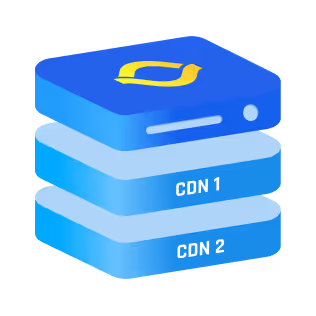What's the Difference Between CDNs and Hosting?
Table of contents
The main difference between a CDN (Content Delivery Network) and hosting lies in their purpose. Hosting is about storing your website or app on a server so it can be accessed online, while a CDN focuses on delivering that content quickly and efficiently to users around the globe.
CDNs work alongside hosting, not as a replacement for it, and they improve speed, reliability, and scalability. Here’s what essentially happens:
What is Hosting?
Hosting is where your website "lives." It’s a server—essentially a computer—that stores all your site’s files, databases, and media. When someone types in your website’s URL, the hosting server sends those files to the person’s browser.
For example, if you’re using a local hosting provider, you’re relying on a single server in a specific location to deliver your content. This server handles all requests for your website—whether your visitor is across town or halfway around the world.
The downside of this setup? Distance. If your server is in New York and someone in Tokyo visits your site, that data has to travel halfway around the planet. This can cause delays, especially for large files like images or videos.
What is a CDN?
A CDN, or Content Delivery Network, is like a middleman with a lot of helpers. It doesn’t replace your hosting server but works alongside it.
A CDN is a network of servers strategically located around the world. When you use a CDN, it stores (or caches) copies of your website’s static content—images, videos, scripts—on these servers.
When someone visits your site, the CDN delivers content from the server closest to them. So, if your main hosting server is in New York and your visitor is in Tokyo, the Tokyo-based CDN server delivers the content. This minimizes delay and speeds things up significantly.
How They Work Together
Think of hosting as the foundation of your site and the CDN as an add-on that makes it better. Hosting ensures your site is online, while the CDN ensures it’s fast and reliable for visitors no matter where they’re located.
Without hosting, your site doesn’t exist online. Without a CDN, your site might still work, but it could be slow and prone to issues like high latency or crashes during traffic spikes.
Core Differences Between CDNs and Hosting
Here’s how CDNs differentiate from hosting:
Examples
- Without a CDN: Imagine you’re running an online store. You host the website on a single server in New York. When a user in Australia visits your site, they experience slow loading times because the data travels halfway around the globe. If there’s a traffic surge, your server might become overloaded and crash.
- With a CDN: Now, let’s say you add a CDN to your setup. The CDN caches your site’s static assets on servers worldwide. When the Australian user visits, they get content from the nearest CDN server, ensuring fast loading times. If traffic spikes, the CDN handles most of it, keeping your hosting server stable.
{{cool-component}}
Why Use Both?
If you’re wondering, “Do I really need both?” the answer depends on your goals. If you’re running a small, local website for a specific audience, a basic hosting plan might be enough.
But if you’re targeting a global audience or want to ensure speed and reliability, adding a CDN is a no-brainer. The CDN market is projected to grow from USD 23.79 billion in 2024 to USD 40.56 billion by 2029, indicating increasing reliance on CDNs for content delivery.
CDN vs Local Hosting – Which Is Better for You?
If you’re thinking about “CDN vs local hosting,” it’s not an either/or decision. CDNs are designed to complement hosting, not replace it. Here’s a quick rundown:
Common Misconceptions
- “A CDN is the same as hosting.”
Nope. A CDN doesn’t store your site’s backend or database; it only caches static content like images, CSS, and JavaScript files. Your hosting server still handles dynamic content and database queries. - “A CDN replaces DNS.”
Not true. DNS (Domain Name System) maps your domain name to your hosting server. A CDN uses DNS to route requests to the nearest server in its network, but they’re different technologies.
CDN Web Hosting and CDN Hosts
Some hosting providers bundle CDN services with their plans, calling it "CDN web hosting." This means they integrate CDN functionality directly into their hosting service, saving you the trouble of setting it up separately.
Examples include platforms like Cloudflare, which offer CDN and hosting solutions in one package. If you’re comparing CDN hosts, look for features like server location, speed, and integration options.
When to Use a CDN
If your website has:
- A global audience.
- High-quality media (like videos or images).
- Traffic spikes (e.g., during sales or events).
- Slow load times for international users.
A CDN is essential.


.png)
.png)
.png)